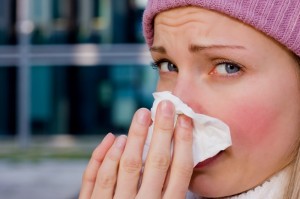Last week, we offered tips on how to prevent the flu this season, because no one likes to get sick on vacation or a business trip. However, sometimes even with the best preventive measures, the flu strikes anyway.
Common flu symptoms include:
- Fever (sometimes)

- Cough
- Sore throat
- Runny or stuffy nose
- Body aches
- Headache
- Chills
- Fatigue
- Vomiting and diarrhea (sometimes)
Below are five simple tips to help if you become sick while traveling:
- Get a prescription for anti-viral flu medications. Your best defense is a flu shot, and antiviral drugs aren’t a substitute. However, they are a good option if you do get sick. These meds aren’t sold over-the-counter, so you’ll need a prescription. The CDC offers lots of information about antivirals, as well as tips for treating your symptoms and avoiding getting those near you sick.
- Stay “home.” If you’re on the road, it’s best to get the rest your body needs by staying in your hotel room to recover, for at least 24 hours after your fever has completely subsided (not just through the use of fever-reducers). If you’re scheduled to leave on a trip, it’s best to avoid travel for the same amount of time. Not only do you need the rest, but you need to avoid making others sick while you’re still contagious. If you do need to go out to get food and medications, be sure to cover your coughs and sneezes and wash your hands frequently. Use hand sanitizer before touching any common surfaces to avoid passing germs along. Typically, a person is infectious from about 1 day before getting sick to 5-7 days after getting sick.
- Drink plenty of water. To avoid dehydration, you need plenty of water or clear fluids.
- Seek medical attention quickly if you’re at high risk. Most people recover from the flu at home without medical treatment. However, those at increased risk should be vigilant about their symptoms and seek medical attention. High risk individuals include those with compromised immune systems and/or chronic medical conditions like heart disease, diabetes, asthma and neurological conditions, those 65 years or older, pregnant women, and young children.
- Contact your travel assistance provider. On Call members can contact us for help in locating a physician and/or pharmacy in your area, or even a hospital if your symptoms are severe.


